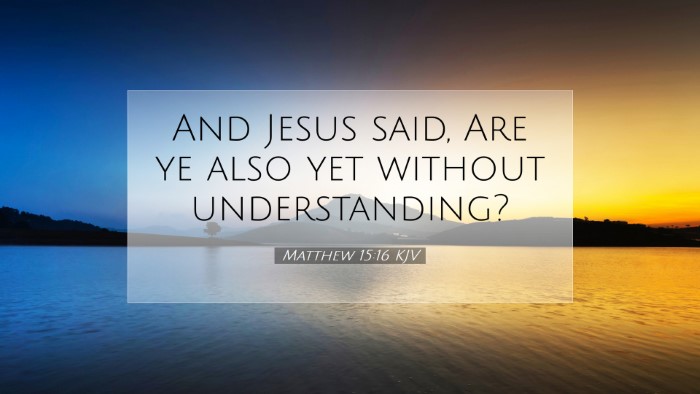Commentary on Matthew 15:16
Matthew 15:16 states: "And Jesus said, Are ye also yet without understanding?" This verse occurs in the context of Jesus addressing the disciples' questions regarding his previous teaching about what truly defiles a person.
Contextual Overview
This passage follows a discussion where the Pharisees criticized the disciples for not following traditional hand-washing rituals before eating (Matthew 15:1-2). Jesus, in turn, challenges their understanding of true defilement, emphasizing that internal conditions of the heart are far more pivotal than external rituals.
Insights from Matthew Henry
Matthew Henry notes that this statement from Jesus indicates a disappointment in the disciples' spiritual insight. His question, "Are ye also yet without understanding?" serves as a rebuke that implies they should have grasped the meaning of what he was teaching. Henry elaborates that lack of understanding is a hindrance to fully experiencing the teachings of Christ. He emphasizes that believers are called to seek wisdom and knowledge, so they can discern truths that lead to spiritual growth.
- Spiritual Insight: Henry underscores the importance of spiritual understanding that transcends mere adherence to traditions.
- Transformation of Heart: The focus of Jesus' teaching lies in the transformation that occurs within, which ultimately leads to righteous living.
Reflections from Albert Barnes
Albert Barnes expands further on the disciples' lack of understanding, arguing that the comment signifies a persistent inability to comprehend Jesus’ straightforward teachings. He suggests that the astonishing nature of Jesus' new covenant teachings often perplexed even his closest followers. Barnes insists that Jesus urges them toward a deeper comprehension of both the law and grace, prompting believers today to develop a relationship with God's truths rather than merely engaging with traditions.
- Need for Growth: Barnes posits that with privilege comes responsibility, as the disciples had been uniquely positioned to receive Jesus' doctrines.
- Encouragement to Seek Deeper Truths: He encourages the reader to pursue enlightenment and a transformative encounter with the Word of God.
Considerations by Adam Clarke
Adam Clarke, in his commentary, interprets this remark as Jesus' pedagogical tool to challenge the disciples. He notes that Jesus often used questions to provoke thought and reflection. Clarke highlights how these moments serve to illuminate the spiritual blindness that can afflict even the most devoted followers. He writes passionately about the necessity of understanding and warns against complacency in one’s spiritual journey.
- Jesus as a Teacher: Clarke points out that the method of asking questions serves to engage the listener actively and promotes a culture of inquiry and understanding.
- Exhortation for Inner Clarity: He emphasizes the importance of clarity in one's spiritual life and how it informs faith practices.
Application and Reflection for Pastors and Scholars
This verse serves as a potent reminder for pastors and theologians about the centrality of understanding in ministry. The question posed by Jesus is applicable for those who lead, teaching that spiritual insight is paramount in guiding others toward genuine discipleship.
- Emphasis on Teaching: Ministries should prioritize fostering understanding among congregants, rather than solely focusing on ritualistic observance.
- Encouragement for Personal Growth: Encouraging believers to wrestle with the meanings of scripture can lead to richer faith experiences and stronger community ties.
- Spiritual Accountability: This commentary encourages spiritual leaders to offer guidance that provokes thought and reflection among their flocks.
Conclusion
In conclusion, Matthew 15:16 stands as a critical junction in the conversation about spiritual discernment. The insights drawn from public domain commentaries reveal the need for deeper understanding in the Christian faith, urging believers to move beyond traditional practices into a vibrant, insightful relationship with Christ. As shepherds of the faith, pastors and scholars alike must embrace this call to facilitate greater spiritual comprehension within their communities.


